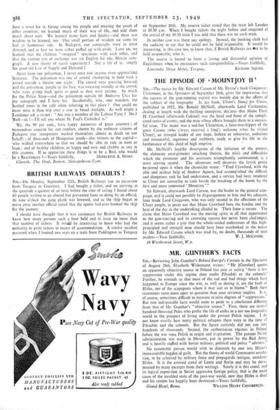MR. GUNTHER'S FACTS
Stu,—Reviewing John Gunther's Behind Europe's Curtain in the Spectator of August 26th, Elizabeth Wiskemann writes: "He [Gunther] quotes an apparently objective source in Poland last year as saying ' there is less suppression under this regime, than under Pilsudski or the colonels.' Further, he reminds us that most of the sad and bad things which have happened to Europe since the war, as well as during it, are the fault of Hitler, not of the scapegoats whom it may suit us to blame." Both these statements seem more open to question than your reviewer implies. It is, of course, sometimes difficult to measure relative degrees of "suppression." But two indisputable facts would seem to point to a conclusion differing from that of Mr. Gunther's " objective source." First, there are several hundred thousand Poles who prefer the life of exiles in a not too hospitable world to the prospect of living under the present Polish regime. I do not know exactly how many political refugees there were in the time of Pilsudski and the colonels. But the figure certainly did not run into hundreds of thousands. Second, the authoritarian regimes in Poland before the war were Polish in origin and inspiration. The present Polish administration was made in Moscow, put in power by the Red Army and is heavily staffed with Soviet military, political and police " advisers."
No reasonable person would wish to diminish by one iota Hitler's immeasurable burden of guilt. But the theory of world Communist revolu- tion, to be achieved by military force and propaganda intrigue, antedates Hitler. It is the avowed creed of Lenin and Stalin and may be docu- mented by many excerpts from their writings. Surely it is this creed, and its logical expression in Soviet aggressive foreign policy, that is the main cause of the troubled state of the post-war world, now that Hider is dead and his system has happily been destroyed.—Yours faithfully,


































 Previous page
Previous page